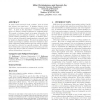Free Online Productivity Tools
i2Speak
i2Symbol
i2OCR
iTex2Img
iWeb2Print
iWeb2Shot
i2Type
iPdf2Split
iPdf2Merge
i2Bopomofo
i2Arabic
i2Style
i2Image
i2PDF
iLatex2Rtf
Sci2ools
101
click to vote
ISSTA
2004
ACM
2004
ACM
Testing malware detectors
In today’s interconnected world, malware, such as worms and viruses, can cause havoc. A malware detector (commonly known as virus scanner) attempts to identify malware. In spite of the importance of malware detectors, there is a dearth of testing techniques for evaluating them. We present a technique based on program obfuscation for generating tests for malware detectors. Our technique is geared towards evaluating the resilience of malware detectors to various obfuscation transformations commonly used by hackers to disguise malware. We also demonstrate that a hacker can leverage a malware detector’s weakness in handling obfuscation transformations and can extract the signature used by a detector for a specific malware. We evaluate three widely-used commercial virus scanners using our techniques and discover that the resilience of these scanners to various obfuscations is very poor. Categories and Subject Descriptors D.2 [Software]: Software Engineering; D.2.5 [Software Engineerin...
Related Content
| Added | 30 Jun 2010 |
| Updated | 30 Jun 2010 |
| Type | Conference |
| Year | 2004 |
| Where | ISSTA |
| Authors | Mihai Christodorescu, Somesh Jha |
Comments (0)

